In pictures: Alex Lifeson's live rig
The Rush guitarist talks us through his Time Machine tour guitar gear
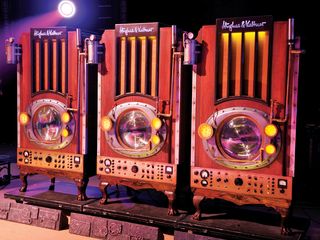
Alex Lifeson's Time Machine live rig
Credit to HG Wells. Without his trusty time machine, prog fans across the world may have never again been able to experience the live version of the Canadian prog kings’ recently reissued 1981 classic, Moving Pictures.
With its Victoriana-meets-sci-fi theme, the Time Machine Tour treats fans to a three-hour long set where Rush play the album in its entirety.
“I’m not sure which of us came up with the idea for the steampunk theme,” says guitarist Alex Lifeson, “but on this tour we really wanted to approach the whole setup with a unified stage presence of the whole idea.
We had these cabinet [cases] made by a company in Toronto - they do sets for movies, too - and round the back there’s a fitting for the CO2 that creates the steam effect and a flat screen monitor for the video displays.
“There is a space for the actual speaker cabs, too,” Alex continues, “but we’re not running them right now. On the first half of the tour we did, but then we tried running straight out of the Palmers [speaker simulators] and it’s cleared up the stage sound remarkably. It’s a lot quieter onstage; it’s a lot easier to put everything through the PA and it makes for a much cleaner and articulated sound for the whole show.”
Total Guitar recently caught up with Lifeson backstage at one of the Time Machine dates to check out his entire live setup. Click through to see the guitars, amps and effects behind the tour…
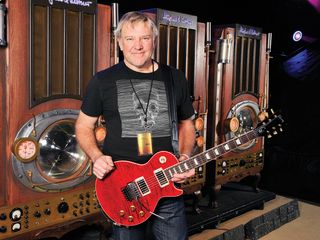
Gibson Custom Alex Lifeson Les Paul Axcess
“This is serial number 003. It’s in Royal Crimson and my other one is in Viceroy Brown - that’s serial number 001 of the actual production run that anyone can buy.
“It’s based on the Axcess model with a thinner body but we went with a very heavy [non chambered] mahogany so it still has weight and resonance. There’s a lot [of electronics] in the guitar so it was important to have a good solid block as a starting point.
“We have coil taps on the pickups, a Floyd Rose and the piezo is the second jack - the Life-O-Sound - that we run independently or you can mix both magnetic pickups and the piezo through the main output.
“We’ve switched out the tone pot for a piezo volume pot to give control there, and then the other tone control becomes a universal tone pot.
“Gibson did a nice job with the neck carve at the back because it’s always been a little difficult to get up high [on Les Pauls]. We really wanted to come up with a good utility guitar on a solid platform like the Les Paul. Gibson was great, and we went through a whole lot of different weight models and pickups.”
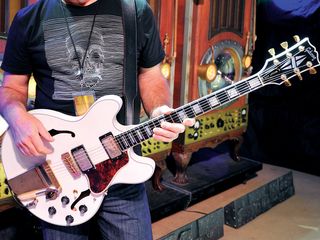
Gibson 1976 ES-355
“This is my baby, the original. When I pick this guitar up and play, it feels so different. It’s got a tiny neck - that’s how they used to do them in the ‘70s.
“When they did the Gibson Inspired By production line of this they went with a much heavier neck, much like a Les Paul’s. I put a micro switch in it so I could preset this rotary pot selector but, to be honest, I never use any of those sounds, it always stays on one.
“I would use this guitar all night if I could - it’s a lot of fun to play. It feels so good. It has a weight to it and you never feel like you’re holding the neck up.”
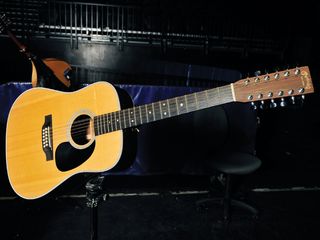
Martin 12-string dreadnought
“I use this to play the instrumental after Neil’s drum solo, when he has a break.”
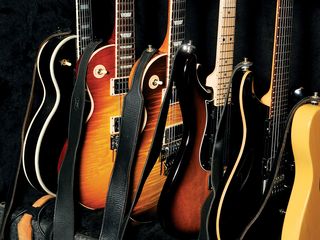
Also in the rack…
Left to right:
Gibson Les Paul
Features on: Stick It Out
“This is Big Al. Little Al’s not here, he’s at my home in my office. It’s detuned to drop D. It’s a really heavy guitar with a Floyd Rose and carved neck heel. It’s got some great sting to it.”
Sunburst Gibson Les Paul Axcess Standard
Features on: 2112 Overture/The Temples Of Syrinx
“When you compare any of the newer [non chambered, Lifeson signature] production models with this you immediately feel the weight difference. I use this for 2112, tuned down [a whole step].”
PRS NF3
Features on: Time Stand Still
“This is something newer PRS have come up with. It replaces the Custom CE with the bolt-on they built for me years ago with the Evans singlecoil pickups. I use it for a very clear, jangly bell-like sound.
“They brought this out at a gig in the States recently and it sounds good - a little more versatile but it has that Fender [style] active kind of element about it.”
PRS CE 24
Features on: Leave That Thing Alone
“I bought this from PRS in 1991, I think. They sent me a guitar then I ordered a couple. That’s a regular bolt-on, nothing particularly special about it but it has 24 frets and I need it for this song, which was written with that guitar.”
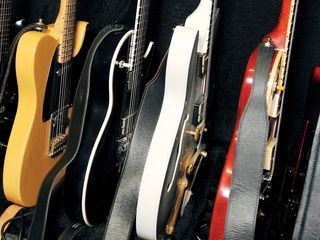
…the rack continued.
Left to right:
1952 Fender Telecaster Reissue
Features on: Vital Signs
“We changed a couple of things. We put the Badass bridge on there and the brass saddles. We also moved the volume pot back because it can be a tight fit in there with these guitars.
“We removed all the finish off the neck years ago; that ‘skin against wood’ feel can really make a difference, with these guitars especially.”
Gibson Les Paul
“I guess this is Big Al’s cousin. It’s a back-up - but I’m not sure what it’s a back-up for!”
Sunburst Gibson Les Paul ’58 reissue
Features on: Camera Eye, Witch Hunt
“That’s another guitar that has a piezo in it.”
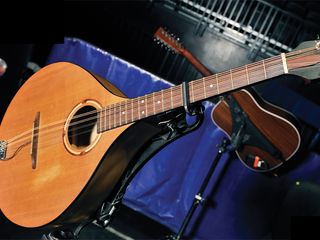
Garrison baritone mandolin
“I use this in a solo section.”
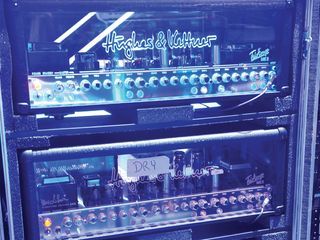
Amps
“I have two signature Hughes & Kettner TriAmp heads and a Hughes & Kettner Coreblade.
“I run one of the heads through the effects return, the other head I run dry. But the Coreblade is sort of an auxiliary head I bring in for specialised sounds. It’s not running all the time but when I need something to give it a pop.
“Lately, I’ve been using it on about 60 or 70 per cent of the songs, but it may only come in at the bridge or during the chorus.
“Another example is at the end of the solo to the song Limelight. On the record we took the last note of the solo and started to regenerate it. To achieve that kind of thing [live] I kick the Coreblade in, set to a long delay with lots of ‘regen’ [repeats] on it.
“Then when I switch it off it continues to carry through and I go back into the main part of the song.”
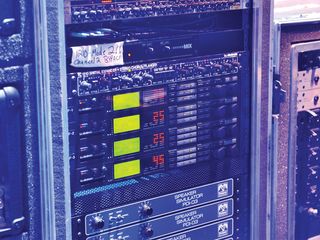
Effects
Racks
“It’s pretty straightforward: mostly delay and chorus but I’m phasing here and there. I’ve been using the [TC Electronic] G-Force units for quite a few years now and haven’t felt any need to change anything.
“I’m running two units for basic delays and then the third one for additional chorusing, reverb and flanging - things like that. There’s a Cry Baby and Behringer noise gate, too.
“I use the TC 1210 for chorus. I love it and I’ve had that for over 20 years… I need to find some wood to touch because I’ve never had a problem with it!”
Fractal Axe-Fx
“The Fractal Axe-FX Ultra is our back-up system - it’s been programmed with all the same effects. Before that we had a couple of little problems on the last tour when I had a very simple backup, and it caused too much stress. No problems on this tour, though; it’s been running really great - touch wood again!
“My tech, Scotty [Appleton], is pushing us to go with the Fractal [for effects] and I’m sure eventually we will. It’s nice to have everything in that little package and it sounds terrific. But I’m sometimes nervous about changing things and I know all my gear.”
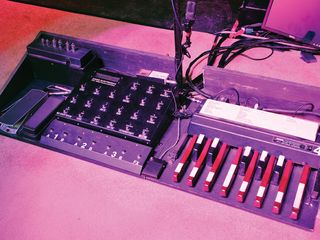
Pedalboard
“I have a switch each side of the pedalboard to activate the piezo on the guitars. It’s more practical. I never touch it on the guitar - it’s only ever activated through the pedal switch.
“I have a volume pedal and wah here with switches for the three amp channels that I use: clean, crunch and overdrive. It switches both of those TriAmps and the [TC Electronic] 1210, G-Force 1, 2 and 3 units.
“I also have presets here on the board to make things easier for a couple of things that I do.
“The Korg pedals here activate keyboard sounds and work as bass pedals for some songs - I use the keyboard sounds on Spirit Of Radio, Time Stands Still, Presto, Stick It Out, Workin’ Them Angels… almost everything.
“I’ve been using this pedalboard for the last 10 or 12 years. There are a lot of things that are changing [with effects technology]. I’m intrigued by the whole main stage idea [effects controlled by a computer hub] but if it ain’t broke…
“I know my system and I know what I hear. I might experiment and take some time looking in that sort of [digital] direction, but right now I like the analogue gear I have.
“We trade things in and out once in a while. We put in an [Electro-Harmonix] Electric Mistress and the original Loft [effects unit] I had from the early 80s. Unfortunately, it blew up!”
Liked this? Now read: Access All Areas: On the road with Rush
Connect with MusicRadar: via Twitter, Facebook and YouTube
Get MusicRadar straight to your inbox: Sign up for the free weekly newsletter

Rob is the Reviews Editor for GuitarWorld.com and MusicRadar guitars, so spends most of his waking hours (and beyond) thinking about and trying the latest gear while making sure our reviews team is giving you thorough and honest tests of it. He's worked for guitar mags and sites as a writer and editor for nearly 20 years but still winces at the thought of restringing anything with a Floyd Rose.
Most Popular










